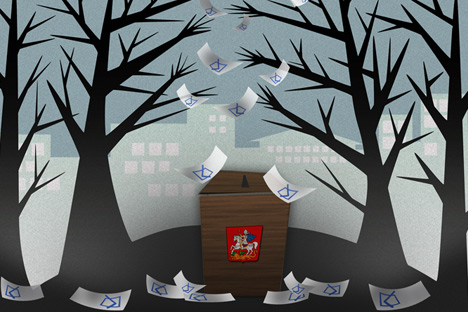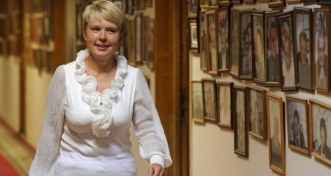Khimki: Chirikova’s political suicide

Click to enlarge the image. Drawing by Niyaz Karim
It looks as if the saga of the mayoral elections in Khimki is to reach its logical conclusion on Sunday. Two candidates have withdrawn from the race, giving a comfortable lead to current Mayor Oleg Shakhov.
The latest forecasts, including from respected polling firms like Romir, give Shakov 41 percent of the vote. Trailing behind him by at least 20 percent is Evgeniya Chirikova, who has led the epoch-making battle for the preservation of the Khimki forest. The outcome appears to be a foregone conclusion. Yet, while the other candidates are likely to take this result in their stride, for Chirikova it might be the end of the political line.
Unlike the other opposition candidates, Chirikova represented the regional movement and was campaigning on a single issue, the fate of the Khimki forest. All sorts of people have sounded off about the need to save the forest, including controversial TV presenters, high-ranking officials and even foreign rock stars. It seemed at one point that the fate of the country was being decided in the Khimki forest.
All of a sudden, it turned out that, behind the Khimki forest problem, were several entirely different problems, some of which were of concern to the local residents, but others were not so important to them.
What lay on the surface was the citizens’ discontent with their former mayor, with his dubious connections and dodgy policies, accompanied by mysterious violent crack-downs on journalists and green activists. That problem was resolved for the local residents by Sergei Shoigu, the popular governor of the Moscow Region, who fired Mayor Vladimir Strelchenko and appointed his own man in his place.
The second narrative in this saga was the prospect of the express highway between Moscow and St Petersburg being scrapped. The issue generated a lot of enthusiasm but, oddly enough, Chirikova failed to politicize the issue, which, for many observers, remained strictly practical.
In particular, it raised eyebrows among Moscow motorists, who regularly face traffic jams on the Leningradskoye Highway leading out of Moscow.
Perhaps the strangest aspect of the Khimki forest affair in 2010-2011 was the hope of some influential forces that the issue would provoke a conflict between Dmitry Medvedev’s people and Vladimir Putin’s entourage and, with luck, cause a clash between the two men.
That plan seems to have come to nothing but the important thing is that it had nothing to do with the real interests of the Khimki residents on whose behalf Evgeniya Chirikova was building a brilliant political career.
So, a regional problem failed to gain a country-wide response, which suggests some thoughts about the current authorities and the opposition.
First of all, the authorities made a shrewd move in putting Sergei Shoigu in charge of the Moscow Region. Now people in the Moscow Region have a leader who is looking to recruit proper managers, a daunting task in these times corrupted by graft and kickbacks.
Secondly, the buzz in Russian opposition circles is that it will not be able to win until it produces a new Yeltsin from its midst, a charismatic leader who can rally the people. The protesters have many charismatic people and every speaker on Bolotnaya Square (with the possible exception of the Left Front coordinator - Sergei Udaltsov) is far more eloquent that the linguistically challenged Yeltsin.
But the opposition has yet to acquire the body of managers, so well known to anyone familiar with the Soviet-era nomenklatura, who may move from place to place, from one job to another, change views and the rules of the game, but always stays afloat and never disappears from the picture in spite of any political changes.
Oddly enough, many Russians still see these people as their real leaders. And these people do not yet see what they would gain by switching to the other side of the barricades and joining the popular protests, as many of them did in 1991.
Yet this is no reason for the authorities to jubilate and pop champagne corks. Sooner or later, the regional nomenklatura will don the opposition’s garb in order to appear modern and appealing to its constituency. It would be hard to appoint someone like Shoigu to every region because, so far, his reputation in Russian politics is unique.
First published in Russian in the Izvestia newspaper.
All rights reserved by Rossiyskaya Gazeta.
Subscribe
to our newsletter!
Get the week's best stories straight to your inbox

